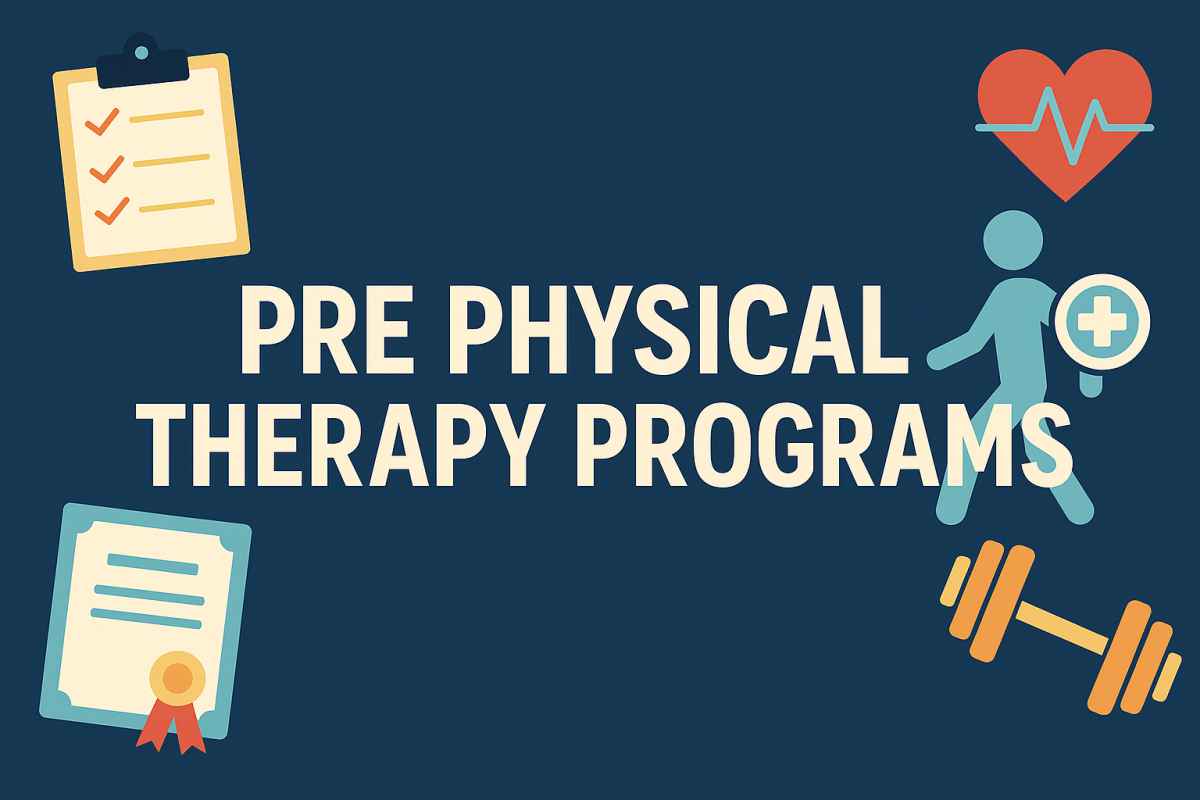If you’ve ever considered becoming a physical therapist, you’ve probably stumbled across the term pre physical therapy programs. At first, it can sound confusing. Is it a major? A special certificate? A whole degree on its own? The truth is, it’s more of a pathway — a set of courses and experiences designed to get you ready for the next big step: a Doctor of Physical Therapy (DPT) program.
In other words, before you can dive into the hands-on world of rehab clinics and patient care, there’s a foundation to be built. That foundation happens during your undergraduate years, and that’s exactly where pre physical therapy programs come in.
What Exactly Are Pre Physical Therapy Programs?
Think of these programs as a “roadmap” rather than a single destination. Universities don’t usually hand you a diploma that literally says Pre-Physical Therapy. Instead, you pick a major — often biology, kinesiology, exercise science, or even psychology — and then follow a track of courses that line up with the prerequisites for graduate-level PT school.
These classes make sure you don’t just waltz into a DPT application with missing puzzle pieces. Admissions committees want to see a well-rounded student who understands anatomy, chemistry, physics, and even behavioral sciences. Pre physical therapy programs ensure you cover all those bases.
Typical Coursework and Requirements
Here’s a peek into what you’d expect to take as part of this track:
Biology (with labs) — because you’ll need a strong grasp of life sciences.
Anatomy & Physiology — the bread and butter of PT.
Chemistry (General & Organic) — yes, reactions matter, even in rehab.
Physics — movement and mechanics explained scientifically.
Statistics or Research Methods — so you can understand studies and data.
Psychology — because physical recovery is often mental too.
Some schools also encourage electives like nutrition, public health, or sociology to round out your understanding of patients’ lives.
And let’s not forget the less academic side: most DPT programs expect applicants to have shadowing hours, volunteer experiences, or internships in clinical settings. So if you’re in a pre physical therapy program, expect to spend time in hospitals or clinics long before you wear the title of “therapist.”
Related Article: What Education is Needed to Become a Physical Therapist?
Which Majors Work Best?
This is where students often stress out: “Do I have to major in something specific?” The answer is no. Pre physical therapy is flexible.
Kinesiology is popular because it directly ties to movement science.
Exercise Science overlaps heavily with PT coursework.
Biology or Health Sciences are also safe bets since they cover required sciences.
Even Psychology majors can make it work if they carefully add the required anatomy and science courses.
What matters most isn’t the major’s title — it’s making sure you complete the prerequisites for grad school.
Pre-Physical Therapy vs. Pre Med
It helps to compare: pre-physical therapy is kind of like pre-med. Neither is a “standalone degree.” Both are collections of courses and experiences preparing you for professional school. The difference is, while pre-med funnels into medical school, pre physical therapy programs funnel into DPT.
Some colleges even brand it with brochures and advising offices, while others simply say, “Pick a science major and we’ll guide you.” Either way, the structure is there.
Related Article: Physical Therapy Programs in NYC
Benefits of Following a Pre Physical Therapy Path
Clarity: You know exactly what classes to take so you don’t waste time.
Preparation: It smooths your transition into graduate school.
Experience: Built-in opportunities for shadowing and internships.
Support: Advisors who specialize in getting students into PT school.
There’s also the mental benefit of community. Many schools have clubs or peer groups for pre-physical therapy students. Studying physics at midnight is a little less miserable when you’re surrounded by people chasing the same dream.
Challenges to Expect
Let’s be real: these programs aren’t a walk in the park. Balancing organic chemistry with volunteer hours can feel overwhelming. Some students underestimate how competitive DPT programs are — it’s not uncommon to apply to 8 or 10 schools.
And unlike other undergrad paths, you can’t slack on grades. A “C” in anatomy could be the difference between acceptance and rejection. So if you’re considering this path, go in with eyes open and a strong work ethic.

Life After Pre Physical Therapy Programs
So what happens after? Once you finish undergrad with your pre physical therapy coursework complete, you’re ready to apply to Doctor of Physical Therapy programs. These typically take 3 years. After that, you sit for the National Physical Therapy Exam (NPTE) and — assuming you pass — you’re officially licensed.
The road is long, yes. But those who stick with it end up in a rewarding career, working directly with patients, helping people walk, recover, and regain independence.
Wrapping It Up — Pre Physical Therapy Programs
At the end of the day, pre physical therapy programs aren’t about fancy titles or shortcuts. They’re about giving you the foundation to succeed in grad school and eventually in the clinic. You’ll take biology, chemistry, anatomy, and more. You’ll shadow professionals, maybe even clean some treatment tables along the way. And you’ll come out stronger for it.
If you’re serious about physical therapy, this is where it starts. A roadmap, a training ground, and the first real test of your commitment.
Related Article: Sports Physicals for Free
FAQ
Is pre physical therapy a major?
No, it’s usually a track or advising path alongside your chosen major.
Do I need a specific major?
Not really. Biology, kinesiology, exercise science, psychology — any can work if you complete the prerequisites.
How long does it take?
Typically 4 years of undergrad with pre physical therapy courses, followed by 3 years in a DPT program.
Is it competitive?
Yes. DPT programs are selective, so GPA, experience, and recommendations all matter.
